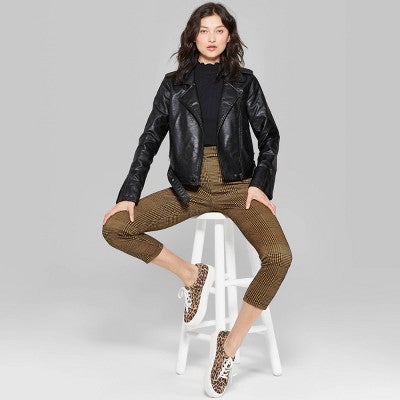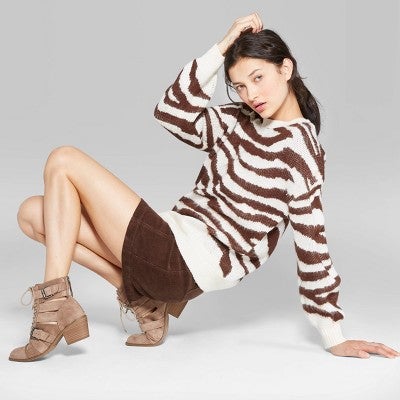Refinery29 is proud to partner with Target to celebrate Gen Z women who are Future Seekers: inspiring activism, challenging the status quo, and unapologetically pursuing their ambitions with excellence. For 22-year-old entrepreneur Tatiana Glover, this means a commitment to cultivating conversations around inclusivity via her favorite medium — fashion.
Tatiana Glover loves clothing. And not just the garments themselves — more specifically, the emotions they evoke, the dialogue they spark, and the memories they hold, so much so that she spent her entire college senior thesis unpacking a rich history of well-dressed women in her family. And after analyzing what the clothes they wore meant in relation to the lives they led, her fascination continued. Now, Glover’s e-commerce brand, Mahogany, is also dedicated to a similar mission of fostering dialogue through fashion.
AdvertisementADVERTISEMENT
“I say I started Mahogany in college, but I really like to think I started it back in high school,” she says. “It was a thought first. I was honestly just frustrated with my teenage experience in retail shopping, because I was on the plus-size end and it was really hard to shop for myself. Eventually I started curating items for all sizes, and I turned it into a website. We started doing in-person events and pop-ups, and it just grew from there.”
Glover’s frustration with the lack of size inclusivity in the fashion industry is, unfortunately, not unique — many women share her experience and are hungry for brands that are acting on the promises they make, rather than just talking the talk. Mahogany is one of those brands. By curating a selection of affordable vintage clothing, hosting panels that empower women of color, and consulting with others in the industry to make sure that her ideas are widespread, Glover is employing her expert eye in every area of her work. All the while, she's sparking dialogue around why inclusivity is so important in the first place. And she's balancing it all with finesse.
“I know ‘inclusivity’ is a really big buzzword right now, but for me, it’s about being intentional about the decisions that you’re making behind the scenes so that it can be reflected in the space you’re creating,” she says. “I’m more interested in how we can do things behind the scenes to make sure that change is being brought to light. I want to be a part of that change, through fashion.”
AdvertisementADVERTISEMENT
Glover is diving into the stories around what people wear and why, and her passion is rooted in contextual awareness and an intellectual curiosity that goes far beyond what’s trending and where to find it. She’s interested in “connecting the old and new” — in other words, finding those pathways through which different generations can establish common ground. Working across generations means Glover has become adept at speaking the language of both old and young, and juggling the unique responsibilities that come with serving people on both ends of the spectrum — perfecting her own strategic balancing act.
“I think all of us have a cultural story to tell when it comes to the garments we grew up with, whether it was our parents or our siblings; there’s a really cool connection to people in the clothing that we wear and the memorabilia that we hold onto. I’m invested in thinking about how our past can predict our future. There’s this gap between generations, this missing gap of a conversation, and I want to fill in that gap through clothes.”
Often, talking to older generations means confronting ageism and working to change initial perceptions that aren’t always accurate. We all have biases, whether we’re aware of them or not, and what we wear contributes to how people see and judge us. For Glover, a vital piece of the equation in building real, authentic connection and making sure brand inclusivity is authentic is about coming to terms with the ways in which those perceptions might need to be corrected.
AdvertisementADVERTISEMENT
“We create ideas of who people are through what we see,” she says. “It’s this ageism, like, Oh, you’re young so you don’t know what you’re talking about. And then there’s the aspect of fashion and what politics are in play there — you look at me, you see how I dress, you see how I talk, and all of those things play a part in how you perceive who I am.”
While Glover spends much of her time talking with people from a wide array of backgrounds and industries, she also makes sure to counterbalance that by prioritizing time with herself. Practically speaking, that means leaving herself sticky notes, going to yoga, sitting in a movie theater solo, affirmations and pep talks in the mirror each morning — the small details of self-care for one woman who is just starting to figure out who she is and what she wants.
“Staying centered means having moments with myself, and I think sometimes we don’t do that enough. We can get caught up on what other people are doing on social media and want to be a part of that, but I’ve learned to just say, My time is going to come. I’m not going to sit on my phone, scrolling, wishing I was doing something I’m not. I’ve been there, but I’m learning to be more comfortable with just being myself.”
Glover’s ambitions in fashion and media are deeply rooted in a family history of women who knew how to dress well, lived according to their own rules, and were confident in the value of their individual narratives. So it should come as no surprise that Glover knows her worth — it’s genetic.
AdvertisementADVERTISEMENT
“I come from a very matriarchal home, and I’ve been raised by a lot of strong Black women. They didn’t have much, but they made things look like money. I think there’s something really special about that. I’m trying to carry that on.”
AdvertisementADVERTISEMENT



